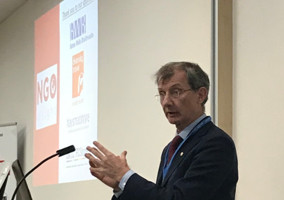Gerald Bates, an international aid auditor at Moore Stephens, gives his top tips for understanding a donor audit and how to make it the most succesful your your aid charity.
When one of your funders commissions an audit or other assurance assignment over your organisation’s use of their funds, you may be immediately tempted to switch on your out-of-office and book an extended period of annual leave. Too often, such assignments are seen as something to be endured, rather than as an opportunity to obtain impartial guidance, reassurance, feedback and suggested improvements.
At Moore Stephens Top 10 accounting and advisory firm, we have a dedicated donor team based across 15 countries. Our team perform over 2,500 assurance assignments each year for a wide range of publicly and privately-funded donors, as well as recipients of donor funds, undertaking fieldwork in more than 150 countries. We’ve drawn on this experience to pull together some top tips to ensure that you maximise the benefit of any donor-engaged assurance assignment and avoid the common pitfalls.
1. Understand the scope of work
As a starting point, it’s important to clarify the scope of the work. Knowing this is vital to ensure you can properly prepare for the process – don’t be afraid to ask for this information if it’s not readily given to you. It’s also important to understand the objectives of the assignment, the procedures that will be applied and the expected output. To what extent you can contribute to the final output draft?
2. Be an active participant
A successful audit will involve teamwork, collaboration and respect. Auditors should show humility in appreciating that you are the expert on your systems and processes. If you believe, therefore, that there may be a better way to gain the assurance needed over a particular area then don’t be afraid to suggest amendments to the approach.
Too often the recipient is passive in discussions regarding the process to be undertaken. Though auditors will apply the judgment and experience of performing similar assignments, your input could result in a more bespoke and efficient approach.
3. Agree a communication protocol
Assurance engagements by nature involve the dissemination and consideration of a wide range of information. One way to streamline the process is to agree, at the planning stage, the information that will be necessary, what format it will be provided in, when it will be provided and by whom. While it may be tempting to send every system manual and all of your accounting data, this will only lead to numerous requests for clarification. It is much better, therefore, to invest the time at the planning stage.
Rarely will an assignment only require input from the finance team; you may well need to include staff from the programme, logistics, procurement, internal audit and HR departments. A further complication arises when programmes are delivered across multiple locations. To what extent will all information be available from your office? What information may need to be retrieved from other sites? Will this cause delays to the process? Providing clear, targeted information will substantially reduce our queries and improve the efficiency of the assignment.
While the audit team are on-site, ground rules should be agreed regarding communication. You may prefer to have all requests for information channelled, in writing, through a set focal point, or you may designate key individuals to be responsible for providing information in certain key areas. You may want to fix times in diaries for any meetings or, alternatively, you may prefer a more open-door approach. Different individuals and organisations will have their own preferred style, so it’s important to agree your preferred approach in advance.
4. Make the most of the time together
Fieldwork should be bookended with formal opening and closing meetings. The opening meeting represents an opportunity for the audit team to be introduced to all key stakeholders at your organisation in the assignment, confirm their approach while on-site and answer any outstanding queries that you may have. The closing meeting is a vital step for presenting provisional observations. We recommend this is held early on the last day on-site, to allow sufficient time for any disputed observations to be cleared up through the provision of additional information before the audit team leave your premises.
Often, the closing meeting will focus on areas of improvement and any identified weaknesses in the procedures. However, it’s also a good opportunity to ask for advice on areas found to be performing well. Remember, auditors who perform this work full-time for donors will have a wide-range of exposure to systems operated by other recipients and, therefore, a good idea of what works well.
If there are areas of ambiguity or uncertainty in the donor’s contractual conditions or frustrations with their management of the programme, this can be an opportunity to raise your concerns. With a working knowledge as to how donor rules are to be applied, auditors can then feedback any weaknesses in the donor’s systems; indeed, some donors actively request such feedback.
Finally, the closing meeting represents an opportunity to work together to identify the practicable remedial steps to take to address any identified weaknesses. To be valuable, it is imperative that these recommendations are suitable for your particular needs and not just ‘boilerplate’ advice that’s not workable for you in practice.
Gerald Bates is an international aid auditor, within Moore Stephens’ dedicated donor department.
Civil Society Media would like to thank Moore Stephens for their support with this article.
Related articles













